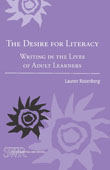This is the fifth of eight excerpts we will be offering from Lauren Rosenberg’s The Desire for Literacy: Writing in the Lives of Adult Learners, a volume in the CCCC Studies in Writing and Rhetoric Series. We’ll be offering a new excerpt each Monday. In this book, Dr. Rosenberg shares the literacy experiences of four learners who attended the Read/Write/Now Adult Learning Center, a library-based informal education site in Springfield, Massachusetts.
 Everybody at Read/Write/Now has a story. There’s Calvin, who has been in and out of the center since it opened. He still sounds out every word when he reads, tracing a line under the text with his leathery brown fingertip and attempting to make meaning. And Terrance, who seeks advice from the teachers about how to handle his divorce. Sometimes he tears up when he talks about how his wife abused him, but then his tears reveal another level of frustration and anger as he describes his meetings with the lawyer, who demands that he sign here and here. The lawyer won’t explain what the documents mean. He won’t read them aloud to Terrance. He talks to him like Terrance doesn’t understand. “Just because you can’t read doesn’t mean that you don’t know,” Terrance trembles when he says this. “It’s unjust! I’m like a blind man.” He explains that people manipulate you when you don’t know how to read and write, and their actions can be “very hurtful.” There are women who had babies when they were girls or who had to raise their mothers’ babies, women who have endured jail sentences, abuse, depression, diabetes. There’s always poverty. This book is about the literacy experiences of four particular people who studied at Read/Write/Now, but it could have been about many other learners who went there because, despite the challenges of their lives, they had always wanted to read and write. …
Everybody at Read/Write/Now has a story. There’s Calvin, who has been in and out of the center since it opened. He still sounds out every word when he reads, tracing a line under the text with his leathery brown fingertip and attempting to make meaning. And Terrance, who seeks advice from the teachers about how to handle his divorce. Sometimes he tears up when he talks about how his wife abused him, but then his tears reveal another level of frustration and anger as he describes his meetings with the lawyer, who demands that he sign here and here. The lawyer won’t explain what the documents mean. He won’t read them aloud to Terrance. He talks to him like Terrance doesn’t understand. “Just because you can’t read doesn’t mean that you don’t know,” Terrance trembles when he says this. “It’s unjust! I’m like a blind man.” He explains that people manipulate you when you don’t know how to read and write, and their actions can be “very hurtful.” There are women who had babies when they were girls or who had to raise their mothers’ babies, women who have endured jail sentences, abuse, depression, diabetes. There’s always poverty. This book is about the literacy experiences of four particular people who studied at Read/Write/Now, but it could have been about many other learners who went there because, despite the challenges of their lives, they had always wanted to read and write. …
One day while I am observing, Lee Ann and her classmate Terrance wrestle with a writing assignment. They both ask me for assistance to the point that each becomes annoyed when I give attention to the other. Lee Ann finally bursts out that writing is too hard, she can’t do it; she storms out of the classroom and out of the building. Terrance remains in the room, worn and quiet. But before long Lee Ann returns, and then she is able to talk with Terrance and me about the frustration they both experience when writing. It’s not like reading, which unlocks culture and offers itself up to them. Writing is about too many rules. It brings back their earlier failures and blocks, reminds them of feeling unable.
I think of Lee Ann at home in her kitchen, showing me the letter magnets on her refrigerator, which she has attempted to form into the “five wh’s” in a list (who, what, where, when, and why), but not all of the “wh” words are correct. This is a self-imposed task, not an assignment she would get at Read/Write/Now. I wonder why she has set up this exercise for herself, and then Lee Ann tells me: this display is her effort at “getting it.” As I listen to her explain her reasons for displaying and memorizing the “wh’s,” I start to understand her rationale: practicing a conventional act of literacy acquisition will give her the winning ticket, the way in to acquiring standard spelling.
All eight of our excerpts from this book will be added here.
